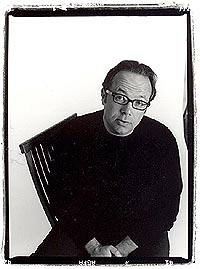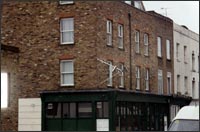The Story Behind the Documentary
By Michael Goldfarb
Host Michael Goldfarb "Make the economy scream." That's what President Richard M. Nixon told his CIA chief Richard Helms after the people of Chile had the temerity to freely elect the Marxist Salvador Allende in 1970.
"Make the economy Scream!" I wonder if Nixon had the screams of Luis Munoz in mind. Following the U.S. engineered coup against the Allende government. Munoz, a union activist, spent 18 months in the torture chambers of General Augusto Pinochet. If Nixon had bothered to ask what an economy screaming actually sounds like Luis Munoz would have told him precisely what he told me, "The screams are extraordinary. You cannot believe your body could produce those kinds of sounds."
*
I was in college from 1968 through 1972 and was as involved in political issues as much as most people. I am not nostalgic for those days but I do miss the moral clarity of events. The right and the wrong were so clearly defined. Of all the events of that time what happened in Chile got deepest under my skin. More than Vietnam, more than the culture wars, more than the fight for racial equality, Chile burned into my heart.
Over the years I have tried to analyze why Chile got so deep. I have no personal connections there. I think there are two primary reasons. The first is education. It's strange how bits and pieces of your adult self can be traced back to a few moments in the classroom. The Scottish poet Alastair Reid was a teacher of mine at Antioch College. Alastair was the first person to translate the poems of the Chilean Nobel Laureate Pablo Neruda into English thus single-handedly sparking the boom in Latin American literature that was part and parcel of campus life in the late 60's. He made Neruda's work live and Neruda's life seem very, very important.
"A nondescript building, on a nondescript street" But my interest in Chile goes back to childhood, to the pages of Weekly Reader, the newsweekly for kids, arguably the most influential publication for those of us who made up the infantry of the counter-culture. Every time Chile was mentioned in Weekly Reader we were told that it was the one truly democratic country in all of South America. It was an island of stability in a sea of military and left-wing dictatorships, the one place where elections were a faithful reflection of the people's will. Chile was presented as a very special place. So when Chileans freely elected a Marxist, Salvador Allende, and the U.S. set about engineering his destruction and tolerating his replacement by a military dictatorship it seemed to me an even more egregious betrayal of the nobility of American ideals than our intervention in Vietnam.
The other reason why Chile got to me was I simply identified with the people who suffered most under Pinochet. Most of the victims were people my age and of my class. They were in many instances doing no more than I had been doing for years: speaking out with adolescent fervor against injustice, trying to force political leaders to act according to the highest ideals. My identification with them was total.
 |


